Alexander 2.9
Alexander the Great (*356; r. 336-323): the Macedonian king who defeated his Persian colleague Darius III Codomannus and conquered the Achaemenid Empire. During his campaigns, Alexander visited a.o. Egypt, Babylonia, Persis, Media, Bactria, the Punjab, and the valley of the Indus. In the second half of his reign, he had to find a way to rule his newly conquered countries. Therefore, he made Babylon his capital and introduced the oriental court ceremonial, which caused great tensions with his Macedonian and Greek officers.
Gaugamela and Babylon
Syria
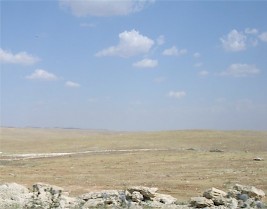
The suppression of the revolt in Samaria, which had caused Alexander's return from Egypt in May 331, was not very difficult. The rebels were rounded up, a part of the country of the Samarians was given to the Jews of Jerusalem, and that was the end of the matter. In the second half of May, the son of Zeus was back in Tyre, which was resettled with veterans and loyal Phoenicians.
Here, Alexander paused, and it is not clear why. Perhaps he was waiting for 15,000 men reinforcements (which set out from Macedonia in the spring) or maybe he expected an attack by the Persian king Darius III Codomannus, but the latter was too clever to attack his opponent in Syria. However, Alexander had not claimed to be the master of the Persian possessions for nothing, and decided to expel the former owner.
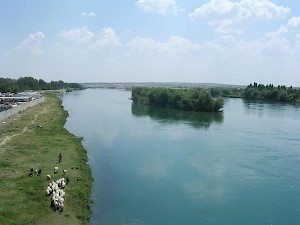
So, at the end of July, a Macedonian army, consisting of 40,000 infantry, 7,000 cavalry and perhaps 2,000 supply wagons, moved to the east and crossed the Euphrates at Thapsacus (Tipsah, "ford", in the local language). Alexander's departure from Phoenicia marks an important change in the war. Until then, he had been fighting in the Mediterranean world, which the Greeks knew well; the country beyond the Euphrates, on the other hand, was not so well-known, and the land beyond the Tigris was terra incognita. The conquest of the Levant had, in a sense, been a defensive war, because it was meant to put an end to the naval offensive of the Persian admiral Pharnabazus in the Aegean sea; from now on, Alexander was on the attack.
Anabasis
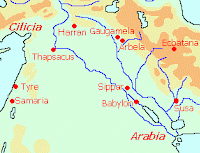
His plan must have been to march along the Euphrates to Babylon, the richest city in the world and the cultural capital of the ancient Near East. It had been done before: in 401, 14,000 Greek mercenaries had taken the same route, and Alexander must have known the description of the road by Xenophon, one of the mercenaries, in a book called Anabasis. However, when Alexander's men were crossing the Euphrates, a Persian army approached from the southeast. It was commanded by Mazaeus, the local satrap.
His presence completely changed the situation: of course, Alexander could attack Mazaeus' army, but it would cost many men their lives and the battle would never be decisive, because king Darius was not there. Moreover, if his victorious army would continue along the Euphrates, it would no doubt march through a country that had been stripped of crops, grass and other commodities. Therefore, Alexander avoided battle with Mazaeus and marched to the north, in the direction of Harran and Edessa, where his army could find food, although no Greek had gone there before. (Moving directly to the east was impossible, because this was a desert.)
Spies told the Macedonian high command that Darius had assembled an enormous army and waited for the invaders on the plains of Assyria. The Macedonians crossed the Tigris on 18 September and almost immediately defeated a small Persian squadron of cavalry that had guarded a nearby place. From a brief but extremely important Babylonian account, we know that the soldiers who were with Darius panicked when they heard the news, which they must have considered a bad omen.
In fact, there was no need to think that the omen was bad. Alexander had behaved like a puppet on a string and had done exactly what Darius had wanted him to do. By leaving the ford in the Tigris almost unguarded and offering only token resistance, he had lured Alexander to the battle ground chosen by the Persian king.
But a worse omen was to shock the Persian soldiers: on the evening of 20 September, the moon was eclipsed, almost immediately after it had risen in the east. To make the omen even worse, Saturn was close by: this was one of the worst possible signs. Moreover, it happened in the sixth month, which was bad for the king of Persia; the western wind suggested that his end would come due to an intruder from the west. A Chaldaean (i.e., an astronomer in Babylon) wrote that during the eclipse, "deaths and plague occurred". Everybody understood that this meant the eclipse of an eastern power, especially since the Magians regarded the moon as the symbol of Persia.
Towards battle
The Macedonian army continued along the Tigris, searching for the Persian army. Alexander must have been happy when his vanguard finally made contact with the enemy a few days later. He had been hoping for one, big decisive battle, and his mounted scouts told him that they had counted thousands of camp fires. Within a few days, he would either be dead or recognized as king of Asia. Alexander ordered his army to build a camp, eleven kilometer north of the Persian position. The nearby village was known as "the dromedary's back", or Gaugamela.
The battle of Gaugamela was to be Darius' battle. He had chosen the terrain, his general Mazaeus had forced Alexander to head for Assyria, his army had intentionally offered no resistance when the Macedonians crossed the Tigris. The battlefield had been leveled to create space for his 200 scythed chariots; stakes, spikes and snares had been placed on either side of the plain and would prevent Alexander's cavalry from encircling the Persian army. At Arbela (modern Erbil), Darius had an excellent supply base. He had set up a trap and if it failed, it was his own responsibility, unless he was betrayed by his own men.
In the night of 29/30 September, Alexander led out his men in battle array, probably intending to surprise the Persians at dawn. (He had done the same at the Granicus river; a religious taboo prevented the Persians from starting a march before the dawn sacrifices had been made.) However, Darius' spies had seen the Macedonian army approaching, and Alexander was forced to cancel the attack. His soldiers were forced to encamp on the site that their opponents had chosen.
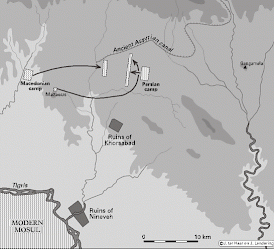
The Macedonian cavalry used the next day for reconnaissance, and the Persians knew that the battle was postponed to 1 October. However, they still feared a night attack, and Darius ordered his men to be on their guard. According to the Greek author Arrian of Nicomedia, this protracted stand under arms tired the Persian soldiers. It may well have been one of the factors that contributed to their defeat; the men had already been caught in a panic, and may have been totally demoralized after the lunar eclipse. As we will see below, the only contemporary source describing the battle states that the men run out on their king on the day of the battle.
According to the Roman author Quintus Curtius Rufus, Darius went along the lines during the night and invoked the Sun, Mithra (the god of justice) and the eternal, sacred fire that was worshipped by the Iranians. According to Curtius, this was meant to encourage the soldiers. Another explanation was that the Persian soldiers were celebrating the Mithrakana-festival, which had to take place in the night of the equinox. In fact, it was two nights after the equinox, but the Persian calendar may have been a bit out of step with the natural calendar.
Gaugamela
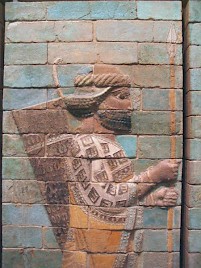
At this point, our Greek sources tell an amusing anecdote. After he had made his battle arrangements and had seen that Darius was prepared too, Alexander was reassured, went to bed and overslept. His right-hand man Parmenion had to wake him up. The story is untrue; the Babylonian account of the events, which was written a few days after the battle and is not contaminated with the propagandistic remarks of Alexander's court historian Callisthenes of Olynthus, makes it clear that the Macedonians attacked early in the morning.
The Macedonian battle plan was more or less identical to that of the battle of Issus: Parmenion was to hold the left wing, and Alexander would be on the right wing with the Companion cavalry. By moving to the right, he would force the Persian left wing to move in the same direction (otherwise, they would be encircled). Inevitably, a gap would grow in the Persian array, and that would be the place where the Companions would break through the enemy lines. Behind the Macedonian battle array was a second line; these troops could be send to the flanks if the Persians - who were superior in numbers - outflanked the Macedonians.
The Persians must have guessed the Macedonian plan, but had not discovered an effective counter-tactic. Nonetheless, Mazaeus, the Persian commander on the right wing, seems to have brought Parmenion into very serious trouble. In fact, the cavalry on the Persian extreme right managed to outflank the Macedonians; however, it did not attack them in their rear, but continued to the Macedonian camp. Still, Parmenion was able to keep the fighting spirit of his men high, so that they stood their ground. This enabled Alexander to lead the decisive charge.
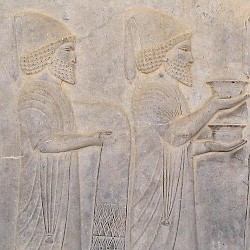
What kind of charge this was, is unknown. The dust of the plain made it very hard to establish visual contact, and it was impossible to see what took place. Neither the Persian nor the Macedonian commanders knew what was going on. At the end of the day, when the Macedonians had been victorious, they tried to find out how this had happened, and assumed that their plan had worked; and this is what was written in the official account of the battle. It may or may not be true, but in fact, the truth lies forever hidden in clouds of dust.
Its needs to be stressed that the contemporary Babylonian account mentions only two incidents, which were probably the most important from an oriental point of view. One of them, an incident in which a standard played a role, is completely absent from the Greek sources; the other flatly contradicts what Curtius Rufus, Plutarch of Chaeronea and Arrian of Nicomedia say - that Darius fled from the battle field and left his men. Instead, the Babylonian author writes that the Persian soldiers left their king. The only Greek author who describes Darius as a powerful warrior is Diodorus of Sicily.
We simply cannot know what happened on 1 October 331, at Gaugamela, except that in the end, the Macedonians were master of the field, but had failed to kill or capture Darius. (More about the battle can be read here.)
Babylon
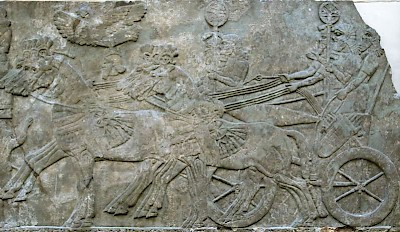
The consequences of the battle of Gaugamela can hardly be overestimated. The great Persian army was no longer there to protect Babylonia, the wealthiest satrapy of the empire, or its capital Babylon, one of the largest cities in the world. Its population was not expected to resist the Macedonians; the Babylonians had revolted as recently as 336/335 under Nidin-Bêl.
The Macedonians looted the Persian camp, plundered Arbela, advanced quickly to the south and on 18 October, they were at Sippar, where Alexander announced that he would spare the houses of the Babylonians. After this declaration, the Persian commander Mazaeus, who had gone from Gaugamela to Babylon, formally surrendered the city and on the twenty-second, Alexander's army entered the city through the famous Ištar Gate and the Procession Street, the victorious king riding in the royal chariot. An eyewitness account survives in the history of Quintus Curtius Rufus (text).
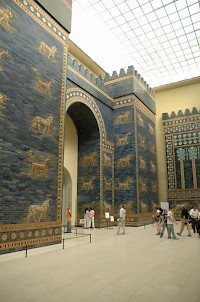
The Babylonians recognized the new ruler as "king of the world", probably a translation of the Greek title Alexander had adopted after the battle near Issus, "king of Asia".
Alexander had promised that his men would not enter the houses of the ancient city, but this did not mean that the Babylonian women were safe. A century before, the Greek researcher Herodotus of Halicarnassus had written that in Babylon, the women had to serve the goddess of love as prostitutes.note This was not true, but Alexander's men believed that the custom existed and behaved accordingly. In a brief digression on Babylonian customs, Curtius Rufus describes how, in his view, the women all behaved like whores - it is easy to see that their behavior was far from voluntary (text).
Now that Alexander had become ruler of one of the kingdoms of the ancient Near East, he had to rule. He appointed Mazaeus as satrap of Babylonia. After Doloaspis in Egypt, he was the first of a number of Persians who held important offices under Alexander. At that moment, most Macedonians will have understood that this was a military necessity, because in the future, satraps would sooner come to terms if they knew they would be reappointed. Later generations of Greek authors, however, saw it as the first sign of Alexander's moral corruption.
One of the discoveries that Alexander's men made in Babylon, was the Astronomical Diary of the Esagila, the temple of the Babylonian supreme god Marduk. For centuries, the officials of this sanctuary had systematically described the celestial phenomena they had witnessed. One of them, Kidinnu, was the first to give an accurate estimate of the length of the year (365 days, 5 hours, 44 minutes, 12.52 seconds, instead of 48 minutes, 45.17 seconds) and proposed a reform of the calendar.
The reports of the Babylonian astronomers were translated into Greek; Alexander's court historian Callisthenes of Olynthus sent them to his uncle, the philosopher Aristotle. The new knowledge was immediately applied: the astronomer Callippus of Cyzicus recalculated the length of the lunar month and proposed a new calendar, in which he used a longer cycle than was usual among the Greeks. His new era started at 28 June 330, eight months after the capture of Babylon.
Susa
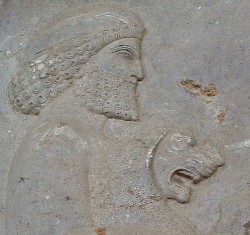
After five weeks in the capital of Babylonia, the Macedonians marched again (23 November). The reinforcements mentioned above had arrived, and everything was ready for the final attack on the four capitals of the Achaemenid empire: Susa, Persepolis, Pasargadae and Ecbatana.
During the march, Alexander appointed several officers. Until then, the Macedonian military units had corresponded to provinces of the Macedonian kingdom, and had been commanded by local chiefs (e.g., a Thessalian aristocrat commanded the Thessalian cavalry). Now, the officers were selected by merit. This is a first indication that Alexander did not want to perpetuate the regional divisions.
The army reached Susa in December. The commander of its garrison, a Persian named Abulites, surrendered the town and its treasures, and was immediately reappointed as satrap of this region, which was called Susiana by the Greeks and is better known to us as Elam.
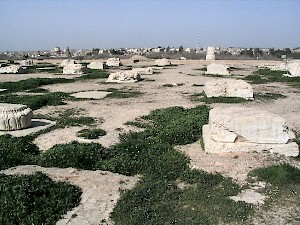
One evening in Susa, a strange accident took place. Alexander sat on the throne in the big hall known as Apadana (throne hall). As it turned out, his seat was too high and his feet could not reach the small bench. One of his courtiers brought a little table, which served excellently. This was taken as a fortunate omen: Alexander's feet had been on Darius' table.
After reorganizing Elam, Alexander left behind 1,000 veterans, and marched on to the heartland of the Achaemenid empire.